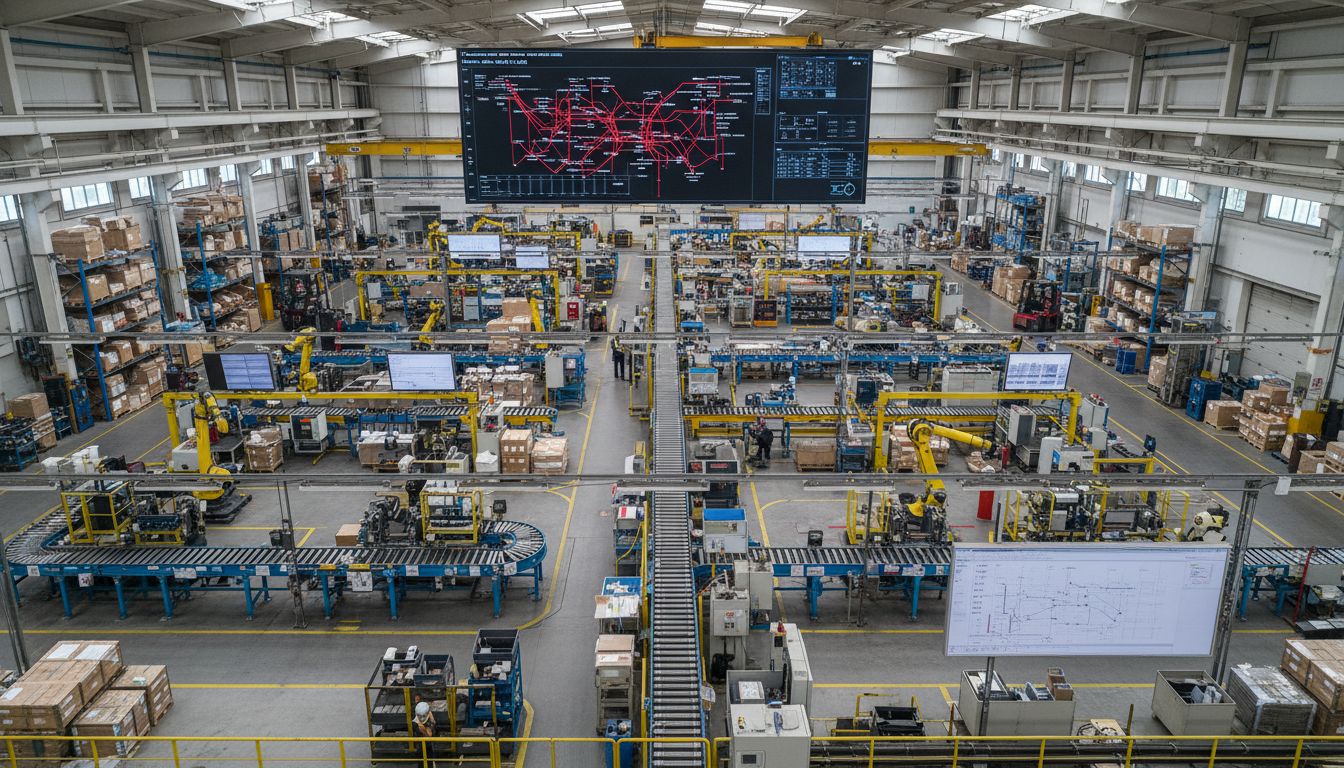8 Top AI Automation Ideas for Business Efficiency

AI automation is showing up everywhere in business and the impact is getting impossible to ignore. While most people picture robots taking jobs or endless lines of code, the real surprise is that companies using AI automation see productivity jump by up to 25 percent. The unexpected part? These smart systems are not here to replace people. Instead, they are actually freeing up human teams to do more creative and valuable work than ever before.
Table of Contents
- Introduction To AI Automation In Business
- Streamlining Customer Service With Chatbots
- Enhancing Marketing Campaigns Through Automation
- Automating Data Entry With AI Tools
- Optimizing Supply Chain Management With AI
- Automating Financial Reporting Processes
- Using AI For Personalized Customer Experiences
- Future Trends In AI Automation For Businesses
Quick Summary
| Takeaway | Explanation |
|---|---|
| AI Automation Empowers Workers | AI enables employees to focus on high-value tasks by automating repetitive processes, boosting overall productivity. |
| Strategic Implementation is Essential | Successful automation requires planning, ensuring alignment between technology capabilities and business needs for effective integration. |
| AI Chatbots Enhance Customer Support | Advanced chatbots improve customer service efficiency by providing instant, personalized responses 24/7 without additional staffing. |
| Data Automation Reduces Errors | AI-driven data entry minimizes human errors and processing time, allowing staff to concentrate on more strategic responsibilities. |
| Personalization Drives Sales | Tailored customer experiences through AI increase likelihood of purchase, highlighting the importance of understanding consumer behavior. |
1: Introduction to AI Automation in Business
Artificial Intelligence (AI) automation represents a transformative approach for businesses seeking strategic operational advantages. At its core, AI automation is not about replacing human workers, but empowering them to focus on high-value strategic activities by streamlining repetitive tasks and enhancing decision making processes.
Businesses today face increasing complexity and competitive pressures. AI automation offers a powerful solution to these challenges by enabling organizations to work smarter, not harder. Learn more about owner-led AI adoption strategies that prioritize human intelligence and technological capability.
Key considerations for successful AI automation include:
- Identifying specific business processes suitable for automation
- Ensuring data quality and technological infrastructure
- Developing a strategic implementation roadmap
According to McKinsey Global Institute, companies that successfully integrate AI automation can potentially increase productivity by 15-25% across multiple business functions. This isn’t about wholesale replacement of human workers, but creating intelligent systems that augment human capabilities.
The most effective AI automation strategies recognize that technology serves human objectives. Humans remain central to design, implementation, and oversight of these intelligent systems. By viewing AI as a collaborative tool rather than a standalone solution, businesses can unlock unprecedented efficiency and innovation.
Successful AI automation requires a nuanced approach that balances technological potential with strategic human insight. Business leaders must move beyond simple task automation to create adaptive, intelligent systems that evolve with organizational needs.
2: Streamlining Customer Service with Chatbots
Customer service represents a critical touchpoint where AI automation can deliver remarkable efficiency and improved user experiences. Chatbots powered by advanced AI technologies are transforming how businesses interact with customers, providing instant, personalized support around the clock.
Get expert guidance on AI implementation for creating intelligent customer service solutions that balance technological capability with human oversight.
The potential of AI chatbots extends far beyond simple scripted responses. Modern chatbots leverage natural language processing to understand context, interpret nuanced customer inquiries, and provide intelligent, contextually appropriate answers.
Key advantages of AI chatbot implementation include:
- 24/7 customer support without additional staffing costs
- Consistent and accurate response quality
- Rapid resolution of common customer inquiries
According to Gartner Research, by 2025, approximately 25% of customer service operations will integrate AI-driven interaction capabilities, signaling a significant shift in service delivery models.
Strategic implementation is crucial. Successful chatbot deployment requires careful design that maintains the human touch while leveraging technological efficiency. Businesses must view chatbots as collaborative tools that augment human customer service representatives, not replace them entirely.
The most effective chatbot strategies incorporate continuous learning algorithms, allowing the system to improve response accuracy and complexity over time. By combining sophisticated AI with thoughtful human guidance, organizations can create customer service experiences that are both technologically advanced and genuinely customer-centric.
3: Enhancing Marketing Campaigns through Automation
Marketing automation represents a powerful approach to transforming how businesses engage with potential customers, optimize campaigns, and drive strategic growth. AI-driven marketing tools enable organizations to create more personalized, data-informed strategies that respond dynamically to customer behaviors and preferences.
Discover advanced marketing automation strategies that leverage AI to create meaningful customer connections.
Modern marketing automation goes beyond simple email scheduling. Intelligent systems can now analyze complex customer interaction patterns, predict potential engagement opportunities, and create highly targeted content experiences that feel individually crafted.
Key capabilities of AI marketing automation include:
- Predictive customer segmentation
- Real-time content personalization
- Automated performance tracking and optimization
According to Boston Consulting Group, companies utilizing advanced marketing automation can potentially increase their marketing ROI by up to 30% while reducing operational costs.
Strategic implementation remains critical. Successful marketing automation requires a nuanced approach that balances technological capability with genuine human insight. The goal is not to replace creative marketing professionals, but to provide them with powerful tools that enhance their strategic capabilities.
By integrating AI-driven insights with human creativity, businesses can develop marketing campaigns that are not just automated, but genuinely intelligent and responsive to evolving customer needs. The future of marketing lies in creating adaptive, learning systems that continuously refine their understanding of customer preferences and behaviors.
4: Automating Data Entry with AI Tools
Data entry represents one of the most time-consuming and error-prone administrative tasks in modern business operations. AI-powered automation tools are revolutionizing this process by dramatically reducing manual input, minimizing human error, and freeing employees to focus on more strategic work.
Explore AI strategies for business leaders to understand how intelligent data management can transform organizational efficiency.
Advanced AI technologies now employ sophisticated optical character recognition (OCR) and machine learning algorithms that can accurately interpret and digitize information from various sources including handwritten documents, scanned forms, and digital records.
Key advantages of AI data entry automation include:
- Dramatically reduced processing time
- Near-zero error rates compared to manual entry
- Seamless integration with existing business systems
According to Deloitte’s Global Intelligent Automation Survey, organizations implementing intelligent automation can achieve up to 70% reduction in manual data processing costs.
Strategic implementation is crucial. Successful data entry automation requires careful planning, ensuring that AI tools are configured to understand the specific nuances of an organization’s data formats and workflow requirements. This isn’t about wholesale replacement of human workers, but creating intelligent systems that augment human capabilities.
By combining advanced AI technologies with human oversight, businesses can transform data entry from a mundane administrative task into a strategic asset that provides real-time insights, improves accuracy, and supports more informed decision making.
5: Optimizing Supply Chain Management with AI
Supply chain management has emerged as a critical domain where AI automation can deliver transformative operational efficiencies. Intelligent AI systems are revolutionizing how businesses predict demand, manage inventory, and respond to complex logistical challenges with unprecedented precision.
Discover strategies to future-proof your business operations through advanced supply chain intelligence.
Modern AI technologies enable businesses to move beyond traditional reactive supply chain models toward predictive, adaptive systems that can anticipate disruptions and optimize resource allocation in real-time. These intelligent platforms analyze multiple data streams simultaneously, including historical performance, market trends, weather patterns, and global economic indicators.
Key capabilities of AI-driven supply chain optimization include:
- Accurate demand forecasting
- Dynamic inventory management
- Proactive risk mitigation strategies
According to McKinsey Global Institute, companies implementing advanced AI supply chain technologies can reduce forecasting errors by up to 50% and reduce overall supply chain costs by 20%.
Strategic human oversight remains essential. While AI can process complex datasets at remarkable speeds, successful implementation requires skilled professionals who understand both technological capabilities and nuanced business contexts. The goal is creating collaborative systems where AI provides actionable insights, and human experts make strategic decisions.
By integrating AI technologies with experienced human judgment, businesses can develop supply chain management approaches that are not just efficient, but genuinely intelligent and responsive to evolving global market dynamics.
6: Automating Financial Reporting Processes
Financial reporting represents a complex, data-intensive process where AI automation can deliver remarkable precision and efficiency. Intelligent systems are transforming how businesses collect, analyze, and present financial information, reducing human error and accelerating critical decision making.
Explore AI strategies for business financial management that leverage cutting-edge technological insights.
Advanced AI technologies now enable real-time financial analysis that goes far beyond traditional reporting methods. Machine learning algorithms can quickly identify patterns, anomalies, and potential risks within financial datasets, providing actionable insights that would take human analysts significantly longer to discover.
Key advantages of AI-driven financial reporting automation include:
- Rapid error detection and correction
- Comprehensive regulatory compliance monitoring
- Advanced predictive financial modeling
According to Deloitte’s Global Automation Survey, organizations implementing intelligent financial automation can reduce reporting preparation time by up to 75% while improving overall accuracy.
Strategic human oversight remains critical. Successful financial reporting automation requires skilled professionals who can interpret AI-generated insights, validate complex algorithmic recommendations, and ensure alignment with broader organizational strategies. The objective is not to replace financial experts, but to provide them with powerful tools that enhance their analytical capabilities.
By combining sophisticated AI technologies with experienced financial professionals, businesses can transform financial reporting from a time-consuming administrative task into a strategic asset that drives informed decision making and supports long-term organizational growth.
7: Using AI for Personalized Customer Experiences
Personalization has become a critical differentiator in today’s competitive business landscape, with AI technologies enabling unprecedented levels of customer understanding and tailored interactions. Intelligent systems now allow businesses to move beyond generic experiences, creating highly individualized engagement strategies that resonate deeply with each customer’s unique preferences and behaviors.
Discover how AI can transform customer relationships through intelligent, data-driven personalization strategies.
Modern AI platforms analyze complex datasets from multiple touchpoints, including browsing history, purchase patterns, social media interactions, and demographic information. These sophisticated algorithms can predict customer needs, recommend products with remarkable accuracy, and create seamless, contextually relevant experiences across different communication channels.
Key capabilities of AI-driven personalization include:
- Real-time customer behavior prediction
- Dynamic content and product recommendations
- Individualized communication strategies
According to Epsilon Research, 80% of consumers are more likely to make a purchase when brands provide personalized experiences.
Human creativity remains essential in designing these intelligent systems. While AI can process and analyze vast amounts of data, human insight ensures that personalization strategies maintain authenticity, respect customer privacy, and align with broader brand values. The goal is creating a symbiotic relationship where technology enhances, rather than replaces, genuine human connection.
By integrating advanced AI capabilities with thoughtful human design, businesses can develop customer experiences that feel simultaneously cutting-edge and deeply personal.
8: Future Trends in AI Automation for Businesses
Artificial Intelligence is rapidly evolving from a technological novelty to a strategic business imperative, fundamentally reshaping how organizations approach operational efficiency, innovation, and competitive advantage. The future of AI automation is not about replacing human workers, but creating intelligent ecosystems where technology and human expertise work in seamless collaboration.
Explore strategic AI leadership insights for understanding the transformative potential of emerging technologies.
Emerging AI trends are pushing boundaries beyond traditional automation, focusing on developing more adaptive, contextually aware systems that can learn, predict, and make nuanced decisions with minimal human intervention. These advanced technologies are moving toward creating comprehensive, integrated intelligent platforms that can understand complex business environments.
Key emerging AI automation trends include:
- Ethical AI development with transparent decision making
- Hybrid intelligence systems combining machine learning and human expertise
- Predictive and prescriptive analytics with increased accuracy
According to World Economic Forum, by 2025, artificial intelligence is expected to create 97 million new jobs while transforming existing roles across industries.
Strategic human guidance remains paramount. Successfully navigating the future of AI automation requires business leaders who understand both technological potential and organizational culture. The most successful approaches will view AI not as a replacement technology, but as an empowerment tool that amplifies human capabilities, drives innovation, and creates more meaningful, strategic work environments.
Businesses that approach AI automation as a collaborative journey, prioritizing ethical implementation, continuous learning, and human-centric design, will be best positioned to thrive in the emerging technological landscape.
Below is a comprehensive table summarizing the main AI automation ideas and their strategic benefits as discussed throughout the article.
| AI Automation Area | Key Points | Main Benefits |
|---|---|---|
| Introduction to AI Automation | Empowers workers, not replaces; strategic planning critical | Boosts productivity (15-25%); frees staff for valuable work |
| Customer Service Chatbots | AI chatbots with NLP provide 24/7 support | Instant answers, cost savings, enhanced satisfaction |
| Marketing Automation | AI-driven analysis, segmentation, content targeting | Higher ROI (up to 30%), reduced costs, deeper engagement |
| Data Entry Automation | AI OCR and ML automate data capture and reduce errors | 70% less manual work, greater accuracy, quicker processes |
| Supply Chain Optimization | Intelligent systems predict demand, manage inventory | 50% fewer forecasting errors, 20% lower costs |
| Financial Reporting Automation | Real-time AI analysis, rapid error detection | Preps reduced 75%, compliance assured, better insights |
| Personalized Customer Experiences | AI analyzes behaviors for tailored interactions | 80% more likely to purchase, strong loyalty |
| Future Trends & Human Collaboration | Focus on ethical, hybrid AI; human strategy is essential | New job creation, more innovative and adaptive businesses |
Ready to Turn AI Automation Ideas into Real Results?
If you are inspired by these eight leading AI automation strategies but feel overwhelmed about where to start or how to ensure sustainable results, you are not alone. Many business owners and executives struggle to connect innovative concepts like intelligent chatbots, personalized marketing, and supply chain optimization with the unique challenges of their own organization. The article highlights a real need for leadership-driven, practical AI solutions that actually deliver on efficiency, risk mitigation, and growth.

Now is the time to act. Let Average Robot guide your journey from exploration to impactful transformation. With over 25 years of expertise across industries, we specialize in empowering SMBs and mid-market companies to adopt AI confidently, creating real value while aligning every step with your business goals. Get practical, demystified guidance, and partner with a team that prioritizes outcomes, trust, and long-term advantage. Discover tailored solutions and take your first step by visiting Average Robot’s consulting hub or dive deeper into our AI adoption strategies for business leaders. If you have marketing pain points, learn how our insights can build real marketing value with AI. Start now to future-proof your operations and drive growth with strategic AI. Your competitive edge begins here.
Frequently Asked Questions
What is AI automation in business?
AI automation refers to the use of Artificial Intelligence technologies to streamline and optimize business processes. It enables organizations to improve efficiency and productivity by automating repetitive tasks and enhancing decision-making abilities without entirely replacing human workers.
How can AI chatbots improve customer service?
AI chatbots can enhance customer service by providing 24/7 support, delivering consistent and accurate responses, and quickly resolving common inquiries. They employ natural language processing to understand customer questions and provide personalized interactions, ultimately leading to improved customer satisfaction.
What are the advantages of using AI for marketing automation?
Using AI for marketing automation allows businesses to create personalized marketing strategies based on customer data analysis. Key advantages include predictive customer segmentation, real-time content personalization, and automated performance tracking, leading to higher returns on investment and reduced operational costs.
How can AI help in financial reporting?
AI can significantly streamline financial reporting processes by automating data collection and analysis, detecting errors rapidly, and ensuring compliance with regulations. This results in faster reporting preparation times and improved accuracy, allowing financial professionals to make more informed decisions.




